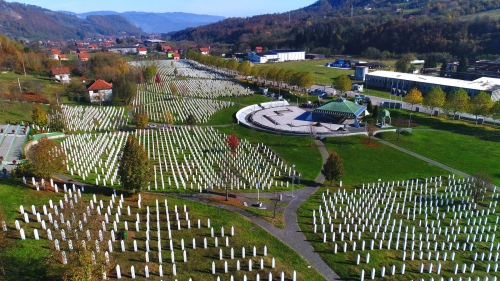A Way Out Of Iraq?
 |
Unnoticed by the mainstream media, the man who might hold the key to a political solution of the war in Iraq recently appeared in Washington, D.C., where he met quietly with U.S. government officials and experts on Iraq and made a brilliant presentation at the Middle East Institute.
Aiham Al Sammarae, Iraq's former minister of electricity, has stepped forward in Iraq as a key link between the Iraqi resistance and the occupation authorities. At tremendous risk to his own life, Sammarae has opened a dialogue with various Iraqi resistance groups, and he has offered to broker talks between those organizations and either the United States or the Iraqi interim government, or both. Currently, Sammarae, an engineer and CEO of KCI Engineering Consultants, heads the National Assembly for the Unity and Reconstruction of Iraq, an organization of Iraqis seeking to prevent the breakup of the Iraqi state and to find a nonsectarian solution for Iraq's divisive politics.
Sammarae delivered an astonishing speech and then spoke to me afterward, making it clear that if the United States wants to negotiate a political solution in Iraq, it could do so with an opposition that is neither faceless, nor invisible, nor disorganized. When I asked him about the reception he received from the U.S. government, he smiled, and said, "It was mixed. It depends on who you talk to." Behind the scenes, other sources say that there are people in the State Department and elsewhere in the U.S. government who are thinking hard about an exit strategy in Iraq and who might be receptive to Sammarae's ideas. Others, predictably at the Pentagon and in the White House, vociferously oppose anything other than the stay-the-course view espoused by President Bush.
According to Sammarae, he and his colleagues have identified 11 major resistance groups, a number of smaller ones and individuals. Each, with the exception of Abu Musab Al Zarqawi's group, has been invited without preconditions to participate in an opening to seek negotiations with the U.S. occupation forces. Several of the most important resistance leaders gave Sammarae a formal letter declaring their willingness to pursue talks with Baghdad and Washington, based on certain demands. These include a fixed timetable for the withdrawal of the U.S. occupation army and the reduction of Iranian influence, both overt and covert, in Iraqi affairs. "The resistance wants the Americans out," he said. "And they want the Persians out."
"We've been talking to the insurgents for a long time, probably since a year ago," he said. "We began by talking to three major groups, and some smaller ones." When I asked him to put a face on the resistance, he named four major groups: the Jaish Muhammad (Army of Muhammad), Jaish Mujahidin (Army of Freedom Fighters), Jaish Al Islami (The Islamic Army), and the Ansar Al Sunnah (Supporters of the Sunnah). Most of them include former Iraqi military officers, and many are comprised largely of Baathists, especially the Jaish Muhammad, said Sammarae.
He strongly criticized the de-Baathification of Iraqi politics (the pet project of Pentagon favorite Ahmad Chalabi), since up to four million Iraqis were members of the party, and the vast majority of them had nothing to do with human rights abuses or war crimes. And he denounced the U.S. decision to disband the Iraqi army, which sent up to 400,000 armed men and experienced commanders into the underground. Under the right conditions, said Sammarae, 70 percent of those military men would return to their barracks and to their units virtually overnight, if called.
Contrary to the conventional wisdom about Iraq, Sammarae said that the majority of Iraqis want a secular, nationalist state. Even in the Shiite community, he said, the ultra-religious parties and militias, especially those tied to Iran, do not command majority support. Many Iraqi families are intermarried and multi-ethnic, and he calls himself a "Sushi," since his family is part Sunni and part Shiite. "Many, many Iraqis are Sushis,"" he said.
The situation in Iraq is critical, he said. Various paramilitary groups are building their forces and trying to control the security organs of the government. Despite Iraq's democratic veneer, the leaders of the current interim regime will not easily give up power if they lose a future election, and they are arming themselves and fortifying their political position.
The absence of coverage of Sammarae's presentation at the Middle East Institute is stunning. It ought to have generated a barrage of questions at daily briefings at the White House, the State Department and the Pentagon. Although it may be a thin reed, what Sammarae said represents a critical opening for exit strategy talks between the United States and the resistance.
Robert Dreyfuss is a freelance writer based in Alexandria, Va., who specializes in politics and national security issues. He is a contributing editor at The Nation, a contributing writer at Mother Jones, a senior correspondent for The American Prospect, and a frequent contributor to Rolling Stone. His book, Devil's Game: How the United States Helped Unleash Fundamentalist Islam, will be published by Henry Holt/Metropolitan Books in the fall.
Source: TomPaine
Related Suggestions
5 % stealing 50% of world's resources by hook or by crook.
all us citizens are culprit of raping this planet earth, excluding the natives living in the reservations.
i would perfer living my whole life in these so called poor reservation rather one day on these monster settlements.

















